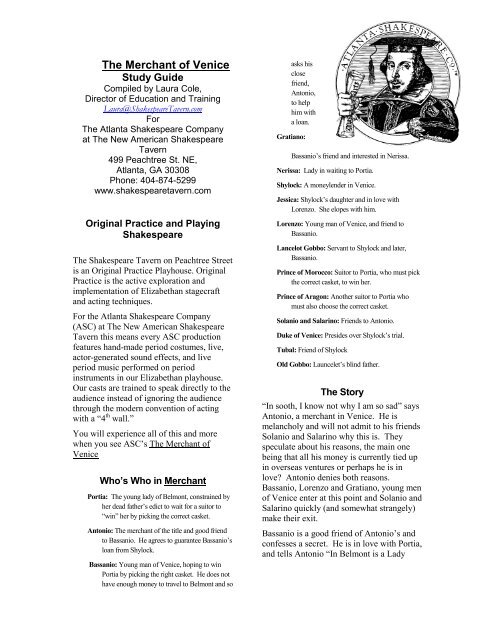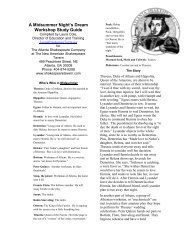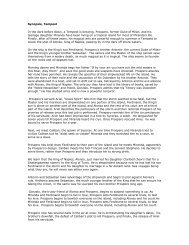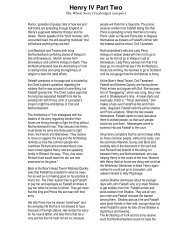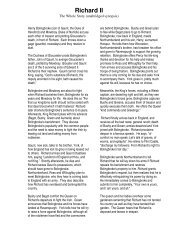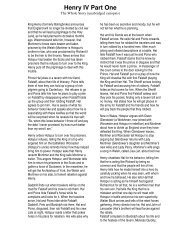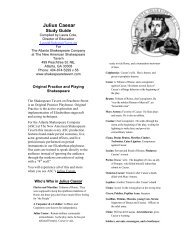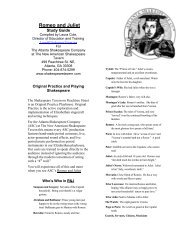Merchant of Venice Study Guide - The New American Shakespeare ...
Merchant of Venice Study Guide - The New American Shakespeare ...
Merchant of Venice Study Guide - The New American Shakespeare ...
Create successful ePaper yourself
Turn your PDF publications into a flip-book with our unique Google optimized e-Paper software.
<strong>The</strong> <strong>Merchant</strong> <strong>of</strong> <strong>Venice</strong><strong>Study</strong> <strong>Guide</strong>Compiled by Laura Cole,Director <strong>of</strong> Education and TrainingLaura@<strong>Shakespeare</strong>Tavern.comFor<strong>The</strong> Atlanta <strong>Shakespeare</strong> Companyat <strong>The</strong> <strong>New</strong> <strong>American</strong> <strong>Shakespeare</strong>Tavern499 Peachtree St. NE,Atlanta, GA 30308Phone: 404-874-5299www.shakespearetavern.comOriginal Practice and Playing<strong>Shakespeare</strong><strong>The</strong> <strong>Shakespeare</strong> Tavern on Peachtree Streetis an Original Practice Playhouse. OriginalPractice is the active exploration andimplementation <strong>of</strong> Elizabethan stagecraftand acting techniques.For the Atlanta <strong>Shakespeare</strong> Company(ASC) at <strong>The</strong> <strong>New</strong> <strong>American</strong> <strong>Shakespeare</strong>Tavern this means every ASC productionfeatures hand-made period costumes, live,actor-generated sound effects, and liveperiod music performed on periodinstruments in our Elizabethan playhouse.Our casts are trained to speak directly to theaudience instead <strong>of</strong> ignoring the audiencethrough the modern convention <strong>of</strong> actingwith a “4 th wall.”You will experience all <strong>of</strong> this and morewhen you see ASC’s <strong>The</strong> <strong>Merchant</strong> <strong>of</strong><strong>Venice</strong>Who’s Who in <strong>Merchant</strong>Portia: <strong>The</strong> young lady <strong>of</strong> Belmont, constrained byher dead father’s edict to wait for a suitor to“win” her by picking the correct casket.Antonio: <strong>The</strong> merchant <strong>of</strong> the title and good friendto Bassanio. He agrees to guarantee Bassanio’sloan from Shylock.Bassanio: Young man <strong>of</strong> <strong>Venice</strong>, hoping to winPortia by picking the right casket. He does nothave enough money to travel to Belmont and soasks hisclosefriend,Antonio,to helphim witha loan.Gratiano:Bassanio’s friend and interested in Nerissa.Nerissa: Lady in waiting to Portia.Shylock: A moneylender in <strong>Venice</strong>.Jessica: Shylock’s daughter and in love withLorenzo. She elopes with him.Lorenzo: Young man <strong>of</strong> <strong>Venice</strong>, and friend toBassanio.Lancelot Gobbo: Servant to Shylock and later,Bassanio.Prince <strong>of</strong> Morocco: Suitor to Portia, who must pickthe correct casket, to win her.Prince <strong>of</strong> Aragon: Another suitor to Portia whomust also choose the correct casket.Solanio and Salarino: Friends to Antonio.Duke <strong>of</strong> <strong>Venice</strong>: Presides over Shylock’s trial.Tubal: Friend <strong>of</strong> ShylockOld Gobbo: Launcelet’s blind father.<strong>The</strong> Story“In sooth, I know not why I am so sad” saysAntonio, a merchant in <strong>Venice</strong>. He ismelancholy and will not admit to his friendsSolanio and Salarino why this is. <strong>The</strong>yspeculate about his reasons, the main onebeing that all his money is currently tied upin overseas ventures or perhaps he is inlove? Antonio denies both reasons.Bassanio, Lorenzo and Gratiano, young men<strong>of</strong> <strong>Venice</strong> enter at this point and Solanio andSalarino quickly (and somewhat strangely)make their exit.Bassanio is a good friend <strong>of</strong> Antonio’s andconfesses a secret. He is in love with Portia,and tells Antonio “In Belmont is a Lady
<strong>Merchant</strong> <strong>Study</strong> <strong>Guide</strong> page 2richly left.” Bassanio is not very rich andseeks a loan from Antonio that he mighttravel in style to Belmont and win fairPortia. Unfortunately, all Antonio’s moneyis tied up in his ships and he cannot lend anymore to Bassanio. He proposes thatBassanio “enquire where money is” furtherand Antonio will guarantee any loanBassanio can find.Portia, meanwhile, is recounting the idiotsshe is forced to entertain when they come tocourt her for her hand in marriage. Herfather left her all his money when he died,but he also left the instruction that any manthat wishes to marry Portia must first choosefrom three small caskets, one made <strong>of</strong> lead,one <strong>of</strong> silver and one <strong>of</strong> gold. Portia wishesthat Bassanio, whom she has met briefly,would come and choose.Bassanio, meanwhile, has met with Shylock,a Jewish moneylender in <strong>Venice</strong>, who hasagreed to loan 3000 ducats, for threemonths, with a guarantee from Antonio.Shylock is a bit doubtful that this is goodbusiness, as all <strong>of</strong> Antonio’s money is tiedup in his ships, but agrees to talk to Antoni<strong>of</strong>irst. Antonio shows up, and Shylock tellsus in an aside, that he hates Antonio because<strong>of</strong> Antonio’s very disrespectful treatment <strong>of</strong>him, and his practice <strong>of</strong> loaning money topeople at no interest, which damagesShylock’s business <strong>of</strong> loaning money withinterest, known as usury in ElizabethanEngland. Rest assured, there is no love lostbetween the two men, and it appears to bequite personal on both their parts.Shylock eventually agrees to loan the moneyat no interest if for “merrie sport” Antoniowill instead guarantee the loan by forfeit <strong>of</strong> apound <strong>of</strong> his own flesh, if he cannot repaythe loan in time. <strong>The</strong> two men agree,although Bassanio expresses somemisgivings. <strong>The</strong>y go <strong>of</strong>f to have thebusiness transaction recorded.Portia is entertaining the Prince <strong>of</strong> Morocco,who has come to try his luck at the casketgame.Launcelet Gobbo, servant to Shylock, istrying to get another job. He meets up withhis old, blind father, and gets Dad tointercede on his behalf with Bassanio.Bassanio hires him on the spot. Bassanioand his friend Gratiano, who will travel toBelmont with him, go <strong>of</strong>f to party the nightbefore they plan on leaving.Jessica, Shylock’s daughter, has beensecretly plotting to leave her father andelope with Lorenzo, a Christian man. She isunhappy in her father’s house and hopes toconvert after marrying Lorenzo. She stealsmoney and jewelry from her father andescapes with Launcelet’s help.Portia, meanwhile, has shown Morocco thethree caskets. <strong>The</strong> Prince picks the goldcasket but he picks wrong and leaves, muchdistressed. <strong>The</strong> Prince <strong>of</strong> Aragon, whoshows up next, picks the silver (wrong,again!) casket.Shylock discovers his daughter’s betrayal,and confronts Solanio and Salarino, whotaunt him for his losses. Tubal tells him thatAntonio has lost his ship and Shylockderives some comfort from that bit <strong>of</strong> goodnews.Bassanio has arrived, to court Portia, andeveryone is on pins and needles, hoping hewill choose the correct casket. He does(hint: it’s the lead one) and Portia gladlymarries him. Gratiano has fallen in lovewith Nerissa and gladly marries her. Salerioarrives at that moment, with Jessica andLorenzo in tow, to deliver the bad newsfrom <strong>Venice</strong>. Portia sends Bassanio withdouble and triple the amount <strong>of</strong> the loan, tohelp her husband’s dear friend out. Afterthey leave, Portia determines to disguise as aboy and follow her new husband back to<strong>Venice</strong>, as a joke. She leaves Jessica andLorenzo in charge <strong>of</strong> her estate while sheand Nerissa are gone.<strong>The</strong> Duke <strong>of</strong> <strong>Venice</strong> has been asked topreside over the forfeiture <strong>of</strong> Antonio’s bondto Shylock. He asks Shylock to be mercifuland have pity on Antonio. Shylock will notand demands his payment. <strong>The</strong> Duke is
<strong>Merchant</strong> <strong>Study</strong> <strong>Guide</strong> page 3troubled deeply and has sent to a wiseDoctor <strong>of</strong> Law named Bellario, for advice.In walk Portia and Nerissa, disguised as ayoung male lawyer “Balthazar” and hisclerk. Balthazar asks Shylock to be mercifuland explains that “Though Justice be thyplea, consider this, That in the course <strong>of</strong>Justice, none <strong>of</strong> us should see salvation.”Shylock wants justice, not the repayment <strong>of</strong>the loan, and since “there is no power in<strong>Venice</strong> can alter a decree established” he, bylaw, can have his pound <strong>of</strong> flesh. AsShylock prepares to take his lawful due,Balthazar warns him that by law he can takeno more or less that an exact pound <strong>of</strong> flesh,nor can he have any blood. If he takesanything else, his lands and goods areconfiscate. Shylock cannot do this and asksfor his principle, instead. Balthazar will notagree to this, since he already refused it oncein open court. In fact, he will not letShylock go at all, until all his goods, landsand money are turned over to Antonio andthe Duke, partly in trust for his new son-inlawand daughter. Before Shylock canleave, Antonio is allowed to decree twothings: the return <strong>of</strong> half his goods, but also,that Shylock give up his religion and convertto Christianity. Mercy, indeed.Portia, still disguised as the lawyer, asksBassanio for the ring she had given her newhusband, as payment for a job well done. Atfirst he refuses to hand it over but Antonioeventually changes his mind. Wheneveryone gets back to Belmont, much gaietyensues as Portia and Nerissa tease theirseemingly faithless husbands. All isrevealed in the end and everyone happilyreconciles.Before a Performance, ThinkAbout This:What is mercy in this play?Who is capable <strong>of</strong> mercy? Who deservesmercy? What do you believe?Why has Shylock remained such anindelible character for us?What do you think are Shylock’s strongpoints? What are his weaknesses? Arethese character traits that you recognize?What has made him this way?Base lead versus tawnie gold:What does Bassanio’s speech in Act III,scene ii mean to you? It starts with “So maythe outward shows be least themselves….”Which casket would you choose?<strong>The</strong>atergoing <strong>The</strong>n and Now:Find out what the typical Elizabethanaudience was like and imagine what aperformance might have been like backthen. What is different about theatre goingnowadays? <strong>The</strong> answers may surprise you!Clue: What would this play be like to watchoutside, in the light <strong>of</strong> day?During a Performance, Watch AndListen For This:Notice what we hear about Shylock beforehis first entrance. Notice what others sayabout him after his first entrance. What dowe hear about Antonio from other people,especially Bassanio? What does Antoniodo- what does he say about other people?Whose actions speak louder than words andwhose words speak louder than theiractions?After a Performance, Talk AboutThis:Religion and the Elizabethan Age:Do some research and discover for yourselfwhat the Elizabethan experience <strong>of</strong> religionmight have been.Which religion was “Elizabethan” anyway?How many people <strong>of</strong> Jewish faith lived inEngland during the period that <strong>Shakespeare</strong>wrote <strong>The</strong> <strong>Merchant</strong> <strong>of</strong> <strong>Venice</strong>?How does your own concept <strong>of</strong> otherpeoples and other faiths reflect or conflictwith an Elizabethan understanding <strong>of</strong> thosepeople or that faith?
<strong>Merchant</strong> <strong>Study</strong> <strong>Guide</strong> Pg 4<strong>Shakespeare</strong> A to Z by Charles BoyceOriginal Practice <strong>The</strong>atre:Does directly addressing the audience affectwhat you think and feel about thecharacters? Does it affect yourunderstanding <strong>of</strong> what is going on onstage?Does it interfere? Why do you think<strong>Shakespeare</strong> wrote his plays this way?What are the benefits to the actor and/oraudience? What are the risks?Words Invented by <strong>Shakespeare</strong>and Used for the First Time in thisPlay:CompromiseGreen –EyedLaughableRivalUndervalueFind for yourself where they appear in theplay! Can you spot them inperformance? Do they mean what youthought they meant?For Further Information/Exploration:Websites:Mr. William <strong>Shakespeare</strong> and <strong>The</strong> Internet:http://shakespeare.palomar.edu/- this sitecontains excellent resources and is a greatmetasite.<strong>Shakespeare</strong>’s Globe websitewww.shakespeares-globe.orgBooks:<strong>The</strong> <strong>Merchant</strong> <strong>of</strong> <strong>Venice</strong> Folger Edition<strong>Shakespeare</strong> and the Jews James Shapiro<strong>Shakespeare</strong>: <strong>The</strong> Invention <strong>of</strong> the Humanby Harold BloomAsimov’s <strong>Guide</strong> to <strong>Shakespeare</strong> by IsaacAsimovStaging In <strong>Shakespeare</strong>’s <strong>The</strong>atres byAndrew Gurr and Mariko IchikawaOur performance text is:<strong>The</strong> Applause First Folio <strong>of</strong> <strong>Shakespeare</strong> inModern Type, Neil FreemanFor more information on the First Folio <strong>of</strong><strong>Shakespeare</strong> go to:http://web.uvic.ca/shakespeare/Annex/DraftTxt/index.htmlMovie Versions:<strong>The</strong> <strong>Merchant</strong> <strong>of</strong> <strong>Venice</strong>, 2004, with AlPacino as Shylock, and Joseph Fiennes asBassanio.Definitions <strong>of</strong> Words Invented for <strong>Merchant</strong>:Compromise- to bind by mutual agreement; to come totermsGreen-eyed- Jealous – WS was the first to modifyjealous with “Green-eyed” and the term has remainedhyphenated to this day.Laughable- humorous or funny; ridiculous or sillyRival- having or making the same claim; competing.Undervalue- to rate as inferior; to rate below the realworth.


